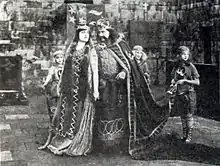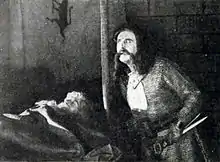Macbeth (1916 film)
Macbeth is a silent, black-and-white 1916 film adaptation of the William Shakespeare play Macbeth.[1] It was directed by John Emerson, assisted by Erich von Stroheim, and produced by D. W. Griffith, with cinematography by Victor Fleming. The film starred Herbert Beerbohm Tree and Constance Collier, both famous from the stage and for playing Shakespearean parts. Although released during the first decade of feature filmmaking, it was already the seventh version of Macbeth to be produced, one of eight during the silent film era. It is considered to be a lost film.[2]
| Macbeth | |
|---|---|
 | |
| Directed by | John Emerson |
| Written by | John Emerson (scenario) Anita Loos (intertitles) |
| Story by | William Shakespeare |
| Based on | Macbeth (play) |
| Produced by | D. W. Griffith |
| Starring | Herbert Beerbohm Tree Constance Collier |
| Cinematography | Victor Fleming George W. Hill |
| Distributed by | Triangle Film Corporation |
Release date |
|
Running time | 8 reels (~7500 feet) |
| Country | United States |
| Language | Silent film (English intertitles) |

In the companion book to his Hollywood television series, Kevin Brownlow states that Sir Herbert failed to understand that the production was a silent film and that speech was not needed so much as pantomime. Tree, who had performed the play numerous times on the stage, kept spouting reams of dialogue. So Emerson and Fleming simply removed the film and cranked an empty camera so as not to waste film when he did so.[3]
Cast
- Sir Herbert Beerbohm Tree as Macbeth
- Constance Collier as Lady Macbeth
- Wilfred Lucas as Macduff
- Spottiswoode Aitken as Duncan
- Ralph Lewis as Banquo
- Mary Alden as Lady Macduff
- Olga Grey as Lady Agnes
- Lawrence Noskowski as Malcolm
- Bessie Buskirk as Donalbain
- Jack Conway as Lennox
- Seymour Hastings as Ross
- Karl Formes, Jr. as the Bishop
- Jack Brammal as Seyton
- L. Tylden as First Witch
- Scott McKee as Second Witch
- Jack Leonard as Third Witch
- Francis Carpenter, Thema Burns and Madge Dyer as Macduff's children
- Raymond Wells as the Thane of Cawdor
- George McKenzie as the Doctor
- Chandler House as Fleance
- Monte Blue (Stunt double for Herbert Tree)
Further reading
- Buchanan, Judith (14 May 2009). "6". Shakespeare on Silent Film: An Excellent Dumb Discourse. Cambridge University Press. ISBN 978-0-521-87199-0.
References
- Macbeth at silentera.com
- Leggett, Steve (29 December 2016). "List of 7200 Lost U.S. Silden Feature Films 1912-29" (PDF). Library of Congress. National Film Preservation Board.
- Brownlow, Kevin; Kobal, John (1979). Hollywood: The Pioneers. Knopf. ISBN 978-0394508511.
External links
- Macbeth at IMDb
- allmovie/synopsis; Macbeth
- Beerbohm Tree and Constance Collier in the film
- another scene with Tree and Connie Collier(Univ of Washington, Sayre collection)